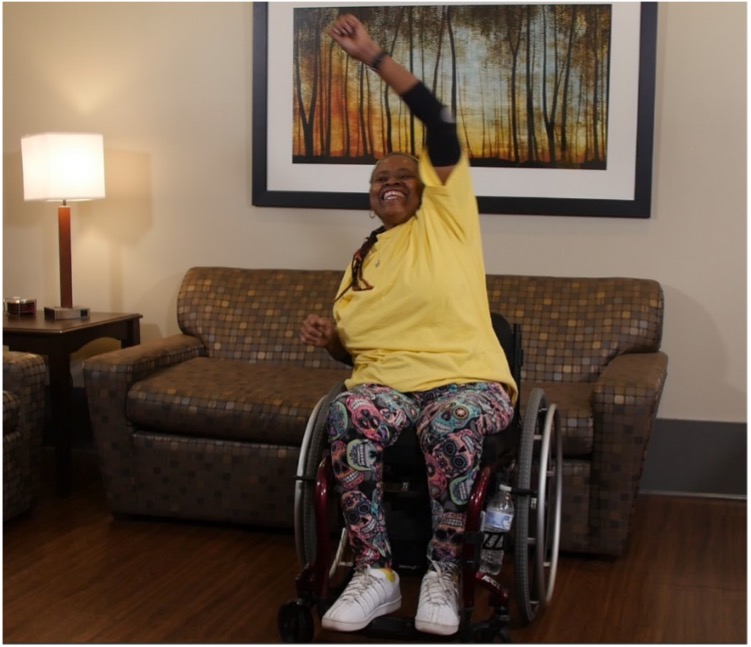 MENTOR Client in Action The UAB/Lakeshore Research Collaborative’s highly popular Mindfulness, Exercise and Nutrition to Optimize Resilience, or MENTOR, program is back in its new iteration. Under the direction of Drs. Jim Rimmer and Zoe Young, and part of the National Center on Health, Physical Activity and Disability, or NCHPAD, the newly expanded CDC-funded program will now allow for a wider array of people to be accepted into MENTOR, which has given people learning to live with a disability not just tangible tools for independent living, but also the confidence to do so.
MENTOR Client in Action The UAB/Lakeshore Research Collaborative’s highly popular Mindfulness, Exercise and Nutrition to Optimize Resilience, or MENTOR, program is back in its new iteration. Under the direction of Drs. Jim Rimmer and Zoe Young, and part of the National Center on Health, Physical Activity and Disability, or NCHPAD, the newly expanded CDC-funded program will now allow for a wider array of people to be accepted into MENTOR, which has given people learning to live with a disability not just tangible tools for independent living, but also the confidence to do so.
In the newest version of the program, MENTOR has its broadest mission and eligibility requirements to date. Anyone with a mobility limitation is eligible for the program, regardless of time of diagnosis or experiencing a new health condition.
“We’re expanding it constantly to open it up to more and more people because we’ve seen that it doesn’t really matter if you’ve had something traumatic happen recently, just having a mobility limitation can present enough of a need to have this kind of information help you achieve your goal,” said Alex Yates, program manager at NCHPAD.
MENTOR is now a remote, eight-week program with “hands on” mindfulness, nutrition and exercise classes conducted by qualified instructors. Each week, the health coach session discusses a different wellness domain: self-care, outdoor time in nature, core values, etc. along with checking in on how their mindfulness, exercise and nutrition classes went that week. By the end of the program, participants have hit all three core wellness domains (mindfulness, exercise, nutrition), and they get a scorecard with those and eight other wellness domains. MENTOR has open enrollment and has new sessions starting each month.
Originally, MENTOR was an immersive five-day residential program for people with spinal cord injury, consisting of activities all relating in some way to mindfulness, exercise and nutrition. The original pilot study was funded by the Craig H. Neilsen Foundation and lasted about two years.
“It was a true deep dive that week, and then the idea was that you get kickstarted with knowledge and then continue to do some follow up and utilize the information you gain for the rest of your life,” Yates said.
After starting as more of a research project, MENTOR shifted to become a community program with a broader mission of helping people transition after a recent diagnosis of one of seven disabilities, mostly related to mobility. This iteration did not prevent eligibility due to recency of diagnosis but was geared toward people who had a new diagnosis or disability in the past two years.
Yates previously worked in research as project coordinator at Lakeshore, so she has seen MENTOR from different perspectives in its different iterations. In her new position, Yates has filled in for Amanda Jeter, who Yates said started the online version of MENTOR with Rimmer. While Jeter is currently on parental leave, Yates is filling in because of her familiarity with the program.
Early on, the “R” in MENTOR stood for recovery, but the program has moved away from a medical mindset, where the program was initially focused on those with an acute diagnosis. Now with more of a wellness model, the “R” stands for resilience.
“I think everyone comes in where they are, and then we just improve from there,” Yates said. “It’s not that anyone has to come in at a specific point, it’s more of wherever you are in your health journey, that’s where you’re starting in MENTOR, and we hope MENTOR is able to help in that.”

